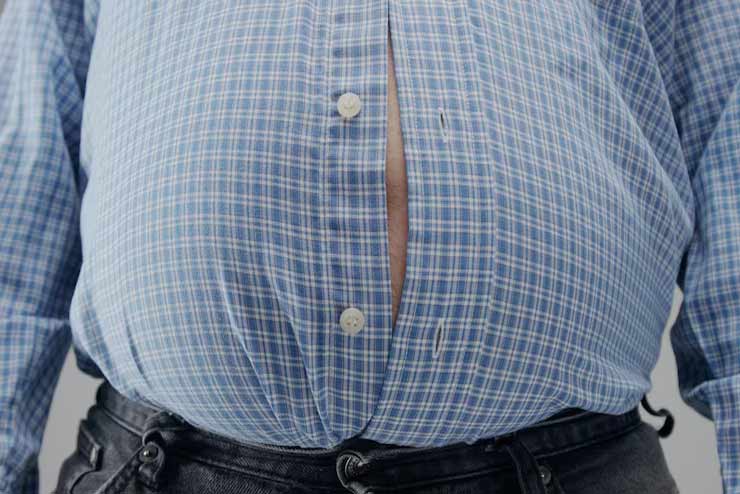What is fat? Fat is a type of lipid, which is a molecule made up of fatty acids and glycerol. Fatty acids are chains of carbon atoms with hydrogen atoms attached, while glycerol is a three-carbon molecule. When fatty acids and glycerol combine, they form a triglyceride, which is the most common type of fat found in food.

Fat is a type of nutrient that is essential for the human body. It is one of the three macronutrients, along with carbohydrates and proteins, that provide energy and help maintain basic bodily functions. Fat is an important component of a healthy diet, but it can also be harmful in excess. In this article, we will explore what is fat, its functions in the body, different types of fat, and how much fat is recommended in the diet.
What is fat used for in the body? Fat has several important functions in the body. One of the main functions is to provide energy. When the body needs energy, it can break down stored fat to use as fuel. Fat also helps cushion and protect organs, insulate the body, and regulate body temperature.
What are the different types of fat?
There are several different types of fat, including saturated fat, unsaturated fat, and trans fat. Saturated fat is typically solid at room temperature and is found in animal products such as meat and dairy. Too much saturated fat in the diet can raise cholesterol levels and increase the risk of heart disease.
What is fat in terms of unsaturated fat?

Unsaturated fat, on the other hand, is typically liquid at room temperature and is found in plant-based foods such as nuts, seeds, and vegetable oils. Unsaturated fats can help lower cholesterol levels and reduce the risk of heart disease when consumed in moderation.
What is fat in terms of trans fat?
Trans fat is a type of unsaturated fat that has been chemically altered to become more stable and have a longer shelf life. Trans fat is often found in processed foods such as baked goods, fried foods, and snacks. Consumption of trans fat has been linked to an increased risk of heart disease and should be limited in the diet.

How much fat should be consumed in the diet? The amount of fat that should be consumed in the diet depends on several factors, including age, sex, and physical activity level. In general, adults should aim to get 20-35% of their daily calories from fat. It is important to choose healthy sources of fat, such as nuts, seeds, and vegetable oils, and to limit intake of saturated and trans fats.
What is fat in terms of dietary guidelines?
The Dietary Guidelines for Americans recommend limiting saturated fat intake to less than 10% of daily calories and avoiding trans fat altogether. Instead, individuals should focus on consuming a variety of healthy fats, such as monounsaturated and polyunsaturated fats, which can be found in foods such as avocados, salmon, and nuts.

In summary, what is fat? Fat is a type of nutrient that is essential for the human body. It provides energy, helps cushion and protect organs, insulates the body, and regulates body temperature. There are several different types of fat, including saturated fat, unsaturated fat, and trans fat, each of which has different effects on the body. To maintain optimal health, it is important to consume a balanced diet that includes healthy sources of fat and limits intake of saturated and trans fats.
What is fat in terms of cooking and food preparation?
Fat plays an important role in cooking and food preparation. For example, when sautéing vegetables or frying food, a small amount of fat is often added to the pan to prevent sticking and to add flavor. Fat can also be used as a binding agent in recipes, such as in baking, where it helps to create a moist and tender texture.
What is fat in terms of taste?
Fat contributes to the taste and texture of food. For example, foods that are high in fat, such as cheese and chocolate, are often described as rich and creamy. This is because fat has a unique texture that gives food a smooth and silky mouthfeel. Additionally, fat can enhance the flavor of foods by carrying and releasing flavor compounds.
What is fat in terms of weight loss?
Many people believe that fat is bad for weight loss and that it should be avoided. However, this is a common misconception.

While it is true that consuming too much fat can lead to weight gain, consuming healthy sources of fat in moderation can actually aid in weight loss. This is because fat helps to keep you feeling full and satisfied, which can prevent overeating and snacking on unhealthy foods.
What is fat in terms of body composition?
Body composition refers to the amount of body fat versus lean mass in the body. While it is important to maintain a healthy body weight, it is also important to maintain a healthy body composition. This means having a healthy balance of body fat and lean muscle mass. Consuming healthy sources of fat, such as omega-3 fatty acids found in fish, can help to promote muscle growth and reduce inflammation in the body.

Fat is an important nutrient that is essential for the human body. It provides energy, helps protect and cushion organs, and regulates body temperature. There are different types of fat, including saturated fat, unsaturated fat, and trans fat, each with different effects on the body. It is important to consume a balanced diet that includes healthy sources of fat and limits intake of saturated and trans fats. Fat also plays an important role in cooking and food preparation and contributes to the taste and texture of food. When consumed in moderation, fat can aid in weight loss and promote a healthy body composition.
Additionally, what is fat in terms of brain health?
The brain is composed mostly of fat, and consuming healthy fats can help to support brain function and cognitive health. Omega-3 fatty acids, for example, are important for brain development and can help to improve memory and cognitive performance. Consuming healthy sources of fat, such as fish and nuts, can help to support brain health and may reduce the risk of cognitive decline as we age.
What is fat in terms of skin health?
Consuming healthy sources of fat can also benefit skin health. Omega-3 fatty acids, for example, can help to reduce inflammation in the body, which may reduce the appearance of acne and other skin conditions. Additionally, consuming healthy sources of fat can help to moisturize and nourish the skin from the inside out, promoting a healthy and youthful appearance.
What is fat in terms of athletic performance?
Fat is an important source of energy for athletes, particularly endurance athletes who require sustained energy over long periods of time. Consuming healthy sources of fat, such as nuts and seeds, can help to provide the sustained energy needed for athletic performance. Additionally, consuming healthy sources of fat can help to reduce inflammation and promote muscle recovery after exercise.
What is fat in terms of hormonal balance?
Hormones are produced in the body from various nutrients, including fat. Consuming healthy sources of fat can help to support hormonal balance, particularly in women. Healthy fats can help to support healthy menstrual cycles and reduce symptoms of PMS.

In summary, what is fat? Fat is an important nutrient that is essential for the human body. It provides energy, helps protect and cushion organs, regulates body temperature, and supports brain, skin, athletic, and hormonal health. Consuming healthy sources of fat is important for overall health and well-being, and it is recommended to limit intake of saturated and trans fats. By understanding what is fat and its different functions in the body, we can make informed choices about the foods we consume and maintain optimal health.
Furthermore, what is fat in terms of heart health?
It is important to be mindful of the types and amounts of fat we consume for heart health. Consuming too much saturated and trans fats can increase cholesterol levels and increase the risk of heart disease. On the other hand, consuming healthy sources of unsaturated fats, such as olive oil and avocado, can help to improve cholesterol levels and reduce the risk of heart disease.
What is fat in terms of digestion?
Fat is an important component of the digestive process. It helps to slow down digestion and keep you feeling full and satisfied. Additionally, consuming healthy sources of fat can help to improve digestion and reduce symptoms of digestive disorders, such as irritable bowel syndrome.
What is fat in terms of cultural significance?
Fat has played an important role in many cultures throughout history. In traditional cultures, fat was often a prized nutrient and was consumed in abundance, particularly during times of scarcity. Fat was also used as a symbol of wealth and status, as only the wealthy could afford to consume large amounts of meat and other high-fat foods.
What is fat in terms of the food industry?
The food industry has often used fat as a means of enhancing the taste and texture of processed foods. However, this has led to the overconsumption of unhealthy sources of fat, such as trans fats. In recent years, there has been a shift towards healthier options and the use of healthier sources of fat in processed foods.

In conclusion, what is fat? Fat is an essential nutrient that plays a vital role in many different aspects of our health and well-being. It provides energy, helps protect and cushion organs, regulates body temperature, supports brain, skin, athletic, and hormonal health, and is an important component of digestion.
While it is important to consume healthy sources of fat, it is also important to be mindful of the types and amounts of fat we consume for heart health. By understanding what is fat and its various functions in the body, we can make informed choices about the foods we consume and maintain optimal health.
The last word is with you, the audience
Be sure to read other educational articles. For scientific issues, be sure to contact a specialist doctor. These materials are only for study and non-educational purposes. Of course, expert doctors can guide you a lot.
Our cooking training center has collected unique materials for you dear ones. This content is very useful and will help you cook the best and most delicious food for yourself and your loved ones at home.
The recipe section is for introducing the best dishes of the nations. Dear ones, you can see the best dishes in this section and cook whatever you want at home. Don’t forget to read the recipe and ingredients before doing anything to determine your cooking needs.
Soon we will be with you with a more professional team with more facilities. We suggest that if you are overweight, fill out the and wait for our experts to contact you and send you the right meal plan.
The slogan we put on our site is to fight obesity. In this regard, we will provide you with many suitable recipes. Be sure to follow our site to learn about many healthy foods. Do not forget that a healthy life requires extensive changes. One of these changes is changing food. So eat healthy
Please follow us on linkedin. You can learn all best french food recipe and best Italian food recipe and best arabic food recipes and best Iranian food recipes you can check our Reddit page.
